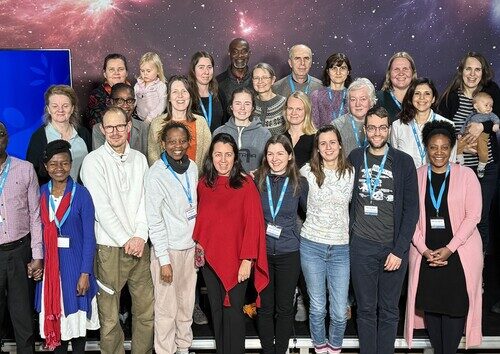The church needs people who continually experience learning and growth as they go about their ministry. Such persons develop as leaders who in turn create positive transformation. They integrate learning and change with their experience. They in turn disciple others who grow as leaders, experience meaning in their service, and contribute significant organizational change.
Such leadership development is an on-going process in which the following eight conditions are established and nurtured. The eight conditions form a cyclical system; each condition promotes the others. Effective integration of this model means that leadership development becomes hard to distinguish from usual ministry. Leadership development is experienced while actually doing ministry, accomplishing and adapting, rather than a distinctive program.
Church organizations and their leaders can intentionally foster this process. But they need to understand that these conditions must be integrated into the on-going life of the local church or the ministry entity rather than seen as a particular program delivered in seminars or workshops. It is not that leadership workshops are not needed. They can draw attention to the process I describe below. And they can provide skill training that enhances specific ministry skills. In hierarchal organizations this model for leadership development requires promotion of a leadership development process within the local church, not one imposed from the top down to the local church.
Condition One: Rethinking Mission
Organizations (including the local church) seeking renewal typically attempt to clarify their mission. The organization has to get its mission straight.
Rethinking mission means an organization identifies and embraces — within its idea of mission that it is a creative relational network in which personal transformation of its members is realized. No longer is mission seen in terms of output alone; mission becomes developing people who learn and change while doing ministry.
In hierarchal organizations positional leaders at some level must experience this resolve. Attitudes about evaluation held by these positional leaders then extend to how a member is changing in their important relationships while they go about ministry. Evaluation of mission becomes weighted toward how people are learning and changing while experiencing ministry.
Condition Two: Interrelatedness
Experience, learning, and changing are seen as parts of a whole process in this leadership development model. They are cyclical and internal, not linear or imposed from outside the community. That is what is meant by interrelatedness.
It is essential that persons who serve religious organizations both understand and nurture this reality. Learning, changing, and doing happen where people are in relationship with one another and working together in their primary community; that is where leadership development takes place.
Every system is in relationship with a broader system. So, though leadership development occurs in the setting of the local church, provision of counsel, assistance, and mentoring from an entity in the broader community such as a conference organization is helpful. That interrelatedness requires positive relationships between the church and the organization.
Experience, learning, and changing are interrelated dimensions that require intentionality from within the primary organization and constant renewal.
Condition Three: Theological Reflection
Significant theological reflection on the nature of leadership is mutually experienced in the on-going life of a healthy church or church organization. Relational processes of seeking meaning-making in the context of doing ministry provide the best ground for that theological reflection.
The vehicle for such activity is highly relational group interaction. I am suggesting these relationships be intentionally fostered. Highly relational groups should be created, and time for mutual reflection around scripture and ministry experience should be scheduled in the ministry context.
Condition Four: Theoretical Learning
Leadership is everyone’s opportunity, so all members of the church or organization should be equipped to critically think about their assumptions regarding the nature of leadership. Theoretical foundations for leadership understanding should form the foundation for this dimension of the leadership development process. Pastors or other positional leaders too often approach learning on this level as their domain without realizing the value to members throughout the organization.
Theoretical learning in the church or church organization can be accomplished by reading groups, annual workshops, and continuing education standards. These activities should be intentionally implemented and designed to foster theoretical learning regarding the nature of leadership.
Condition Five: Reflection on Leadership Practices
People experience leadership through specific behaviours they observe in their community including building shared vision, practicing solid integrity, challenging the status quo, empowering people, demonstrating abundance mentality, and relating to diversity. Attitudes are interpreted and formed as these practices are observed.
Think again about the cyclical nature of leadership development. It is certainly true that the heart of a person changes through theological and theoretical learning in the community. But an additional step is needed. That step is the skill of reflection. The opportunity for leadership behaviours to generate change within the heart of members of an organization is proportional to the skill and time devoted to reflection.
Reflection on leadership practice means identifying behaviours, analysing, and critically thinking. Relationships in religious organizations between peer leaders, managers, and positional leaders should foster conversation that is reflective, aside from evaluation regarding productivity. Additionally, continuing education should provide emphases on leadership practices involving skills in reflection.
Condition Six: Experiential Learning
The ministry itself provides a transforming opportunity within an organization. This condition is distinct from reflection on leadership practices in that it grasps the value of what might otherwise be seen as ordinary work having nothing to do with leadership or its development. People have the capacity to find meaning and experience change as they go about mundane activity.
Experiential learning requires recognition of the value of the ministry. Such a culture will produce self-directed reflection on just how ministry is done, how it may improve, and what it means to contribute through ministry. A culture of experiential learning is produced by affirming experimentation, valuing the learning failure provides, providing peer feedback, offering coaching, and performance reviews that emphasize the learning that is taking place while doing the ministry itself.
Condition Seven: Training
Skill training for a wide range of ministry skills such as strategic planning, conflict management, managing meetings, managing change, communication, financial administration, human resource management, or other specific ministry challenges should be provided in the context of the church in an intentional and professional manner with affirmation given by endorsement or certification of the specific skills pursued.
Condition Eight: Feedback
A 360 degree assessment tool that provides feedback from peers, those served, and those that a person reports to should be applied no less than every fourth year to provide feedback to the leader. The growth of the organization around important values can be measured and interpreted as the transforming impact of leadership. We need to listen to the voice of others who can affirm our strengths and help identify our areas of challenge!
Conclusion
These eight conditions are integrated dimensions of an on-going transformational leadership development process creating positive change for organizations. The process must be experienced within the ministry of the local church or other organization and is on-going. In hierarchal organizations, the role of supporting leadership development from one organizational level to another is to provide consultation and guidance in establishing the process.
============
Skip Bell, DMin
Professor of Christian Leadership,
Director of the Doctor of Ministry Programme,
Andrews University
Leadership Development Journal – April 2012


